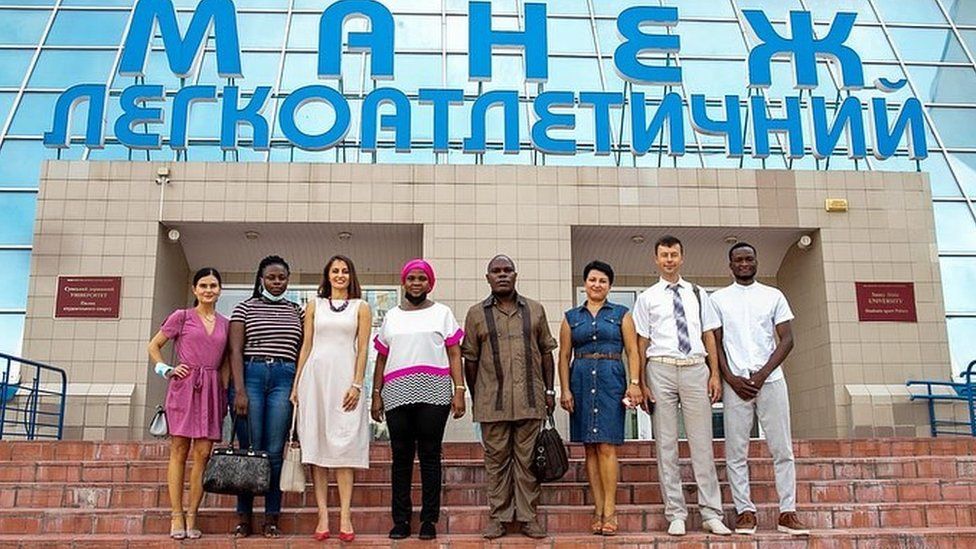The message from Nigeria’s medical council could not have been more cruel for student Moses Damilola Fehintola.
After being trapped by war in Ukraine earlier this year, it was a relief when he escaped and was able to continue his medicine degree online.
But one day a WhatsApp message in capital letters pinged on his phone, telling him his distance-learning qualifications would not be recognised after all.
The language was cold and formal.
“We wish to inform the General Public that Medical and Dental Degree Certificates issued by Medical Schools from Ukraine from 2022 will NOT be honoured by the Medical and Dental Council of Nigeria until when normal academic activities resume.”
Mr Fehintola gasped as his vision blurred for a moment. “Jesus,” he muttered in exasperation.
“What’s going on?” his mother asked, glancing across as they drove to a local market in Oyo state. Mr Fehintola mumbled a few words and tried to play it down.
“The news hit me really hard… So many thoughts flooded my mind,” he recalls. “I was actually looking forward to graduating from Ukraine irrespective of whatever happened.”
He was in his sixth and final year of study at Ukraine’s Sumy State University and was months away from finishing, when the city came under siege by invading Russian troops.
The 22-year-old was left trapped for several weeks before he made it home – he was one of more than 1,000 Nigerians, mostly students, to return from Ukraine.
Despite the raging fighting, Sumy State University and other Ukrainian institutions managed to continue to provide online courses and so Mr Fehintola assumed he would be able to achieve his dream of working as a doctor after all.
However, his plans have now been left in ruins.
“I’m in Nigeria now trying to do clinical practice, because l want to meet the requirements to be able to practise as a doctor in Nigeria,” Mr Fehintola told the BBC.
“First l wrote to my own state Ministry of Health requesting to be posted to a hospital, but on getting to the hospital, the medical director there said: ‘Oh, you are from Ukraine, was it not the place that the certificates were cancelled by the MDCN?”‘
“I was so shocked – I just had to say: ‘Yes’ because it’s the truth. From then on, there was that look, and l know there was going to be a stigma – that attitude of: ‘This guy is from Ukraine, his certificate is not valid.'”
“I was so shocked – I just had to say: ‘Yes’ because it’s the truth. From then on, there was that look, and l know there was going to be a stigma – that attitude of: ‘This guy is from Ukraine, his certificate is not valid.'”
The MDCN has not responded to the BBC’s request for comment.
Describing the policy as discriminatory, Mr Fehintola said he has thought over the announcement and has chosen to be motivated rather than see it as a drawback.
“l will say this to Nigeria: if that’s what Nigeria wants, so be it. I will look for other countries to practise and that will be Nigeria’s loss.”
Grace Ladi Musa, who was five years into a medical degree at Kyiv Medical University when the war broke out, agrees.
“It’s just not fair,” she says.
The 23-year-old tells the BBC the plans she had for her life have been turned upside-down – first by the war, then by the revelation that her studies would be considered invalid.
“I hope the Nigerian ministry of education would have a rethink.”
Another medical student has even stronger words for Nigeria’s authorities.
“Our own country is turning us away,” says Emmanuella Oiza, a 17 year old in her second year of medical studies at Sumy State University.
“People are trying to get themselves better educated to come back home and make the country better, but you are sending them away.”
The only solution is to mobilise, says 24-year-old veterinary student Samuel Otunla.
He plans to bring together Nigerian returnee students and petition the government to reverse the decision, and accuses it of failing to manage education to the extent that studying abroad is the only option for those who can afford it.
The Medical and Dental Council of Nigeria has advised students who are currently studying medicine or dentistry in Ukrainian medical schools to seek transfers to accredited institutions in other countries.
It states that online medical training done in any part of the world falls short of accepted standards, and will not honour any medical degree certificates issued at the end of any online medical training.
“We want to serve our fatherland,” says Mr Fehintola. “We want to help save lives in our own community, that’s what pushed us into becoming doctors in the first place.
He also pays tribute to Ukraine.
“A country that is able to forge ahead in a war period to make sure their students still get the necessary requirements for studies, they are really the hero of this situation. Trying to rubbish their certificate I think is a slap to the Ukrainian government.”
Culled from: www.bbc.com


